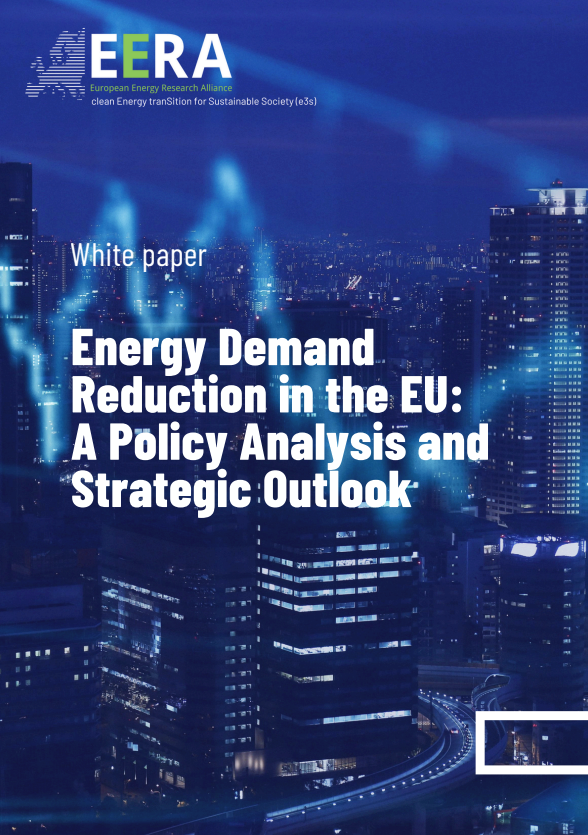EERA JP e3s works collaboratively with its members to produce high-quality inputs for progressing policy making at EU and national level on the Social Sciences and Humanities aspects related to the energy and climate fields.
 The EERA Joint Programme on clean Energy tranSition for Sustainable Society (JP e3s) white paper titled “Energy Demand Reduction in the EU: A Policy Analysis and Strategic Outlook” presents a comprehensive analysis of how reducing energy demand can become a cornerstone of Europe’s clean energy strategy.
The EERA Joint Programme on clean Energy tranSition for Sustainable Society (JP e3s) white paper titled “Energy Demand Reduction in the EU: A Policy Analysis and Strategic Outlook” presents a comprehensive analysis of how reducing energy demand can become a cornerstone of Europe’s clean energy strategy.
As the EU faces the dual challenges of climate change and energy security, the paper highlights that lowering energy demand—through efficiency, sufficiency, and behavioural change—is not just a short-term response to crises, but a strategic necessity for achieving climate neutrality by 2050.
The white paper provides:
- A critical review of EU policies (Fit for 55, REPowerEU, Green Deal Industrial Plan) and their treatment of energy demand reduction, particularly in the household sector.
- An exploration of alternative economic models—such as post-growth, degrowth, and sufficiency frameworks—that can reshape consumption patterns and reduce systemic dependency on energy and materials.
- Policy recommendations to strengthen the role of demand reduction alongside technological innovation and supply-side measures.
Key findings show that while EU initiatives have advanced efficiency and behavioural measures, energy sufficiency remains largely absent from policy frameworks. Without explicit sufficiency strategies, the EU risks missing opportunities to reduce absolute energy consumption and ensure a just and sustainable transition.
READ THE PAPER
 EERA Joint Programme Clean Energy Transition for Sustainable Society (JP e3s) has published a white paper on a Just Energy Transition (JET), addressing both the theoretical and the policy challenges of ensuring that the justice dimension is properly considered and implemented in EU energy transition pathways.
EERA Joint Programme Clean Energy Transition for Sustainable Society (JP e3s) has published a white paper on a Just Energy Transition (JET), addressing both the theoretical and the policy challenges of ensuring that the justice dimension is properly considered and implemented in EU energy transition pathways.
In this paper, JET is intended in the exclusive sense of the European socio-economic and environmental consequences and ethical implications of transitioning from fossil fuels to sustainable energy sources.

JP e3s has contributed extensively to the EERA Flagship Report on Energy Demand Reduction, having a specific Sub-Programme dedicated to the the topic (Sub-Programme 1).
As Europe powers through the energy transition, climate mitigation and Strategic Autonomy objectives, the report argues that a strong strategy for long-term demand reduction, encompassing all energy-consuming sectors (not only households), is critical.
Despite the clear prevalence of demand reduction as a key tool in transforming our energy systems and the economy as a whole, limited research and policy-orientated approaches exist on this topic, as focus has predominantly centred on the technological, supply-side solutions to furthering the CET.
This report provides a reliable analysis of the state of play of the collective knowledge base on energy demand reduction (IEA, IPCC, etc.) through the lenses of scientists from across Europe, and concludes that the most effective methods to reduce energy demand fuse a combination of three key demand reduction strategies, namely behavioural change, energy efficiency, and energy sufficiency.